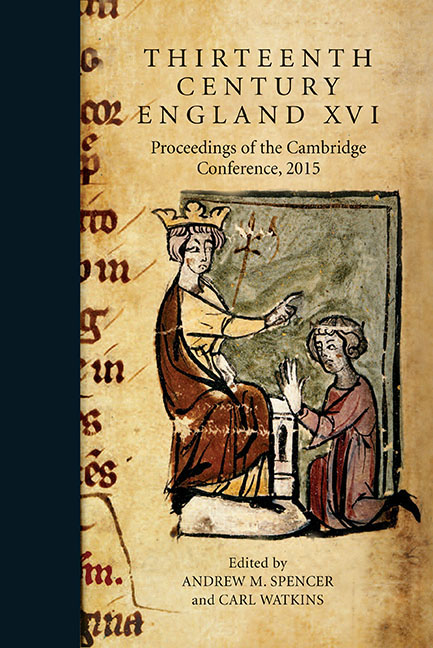Book contents
- Frontmatter
- CONTENTS
- List of Illustrations
- List of Contributors
- List of Abbreviations
- Introduction
- The Uncertainties of Reformers: Collective Anxieties and Strategic Discourses
- Moral Dilemmas in English Confessors’ Manuals
- Damnatio Eternae Mortis or Medicinalis Non Mortalis: The Ambiguities of Excommunication in Thirteenth-Century England
- The Contribution of Thomas Docking to the History of Political Thought
- Dealing with Inadequate Kingship: Uncertain Responses from Magna Carta to Deposition, 1199–1327
- The Rebel's Four Dilemmas in the Long Thirteenth Century
- The Daughters of William the Lion and Queen Ermengarde
- Simon de Montfort and the Ambiguity of Ethnicity in Thirteenth-Century Politics
- The Hue and Cry in Thirteenth-Century England
- Recalling Anglo-Scottish Relations in 1291: Historical Knowledge, Monastic Memory and the Edwardian Inquests
Recalling Anglo-Scottish Relations in 1291: Historical Knowledge, Monastic Memory and the Edwardian Inquests
Published online by Cambridge University Press: 23 August 2019
- Frontmatter
- CONTENTS
- List of Illustrations
- List of Contributors
- List of Abbreviations
- Introduction
- The Uncertainties of Reformers: Collective Anxieties and Strategic Discourses
- Moral Dilemmas in English Confessors’ Manuals
- Damnatio Eternae Mortis or Medicinalis Non Mortalis: The Ambiguities of Excommunication in Thirteenth-Century England
- The Contribution of Thomas Docking to the History of Political Thought
- Dealing with Inadequate Kingship: Uncertain Responses from Magna Carta to Deposition, 1199–1327
- The Rebel's Four Dilemmas in the Long Thirteenth Century
- The Daughters of William the Lion and Queen Ermengarde
- Simon de Montfort and the Ambiguity of Ethnicity in Thirteenth-Century Politics
- The Hue and Cry in Thirteenth-Century England
- Recalling Anglo-Scottish Relations in 1291: Historical Knowledge, Monastic Memory and the Edwardian Inquests
Summary
On 8 March 1291, Edward I sent out a writ under his privy seal addressed to Evesham abbey. Not all the text survives but what does is clear:
We command and enjoin you [the abbot and convent], by the faith and love which binds you to us, to scrutinize your chronicles, and everything which you find there concerning those things which touch our kingdom and the governance of Scotland—whatever it may be— you must, without delay, send it to us under your seal. Just as we trust in you, so too should you not fail to do this.
Edward I had thus ordered the abbot and monks of Evesham abbey to consult their historical archives to find evidence which touched ‘our kingdom and the governance of Scotland’. Whatever they found, they were to send back to the king, whose commissioners would examine the information to establish Edward's authority over Scotland. In the background was the need to prove the legality of Edward's lordship over the Scottish kingdom so as to establish him as judge over, rather than arbitrator of, the claims of the ‘competitors’ to the kingship of the Scots. The messenger who delivered this writ must have made the urgency clear; the monks managed to send a return back to Edward on 12 March 1291, although they complained of the brevitas temporis in which they had to complete the task. The urgency was understandable. On 10 May 1291, the Great Cause opened at Norham, apparently with some sort of statement detailing the historical evidence behind Edward I's claim to dominium over the kingdom of the Scots. Evidence was required fast and, accordingly, was received quickly.
Evesham was not the only monastic house to receive a writ of this kind. We have surviving copies of writs sent to Chester and Sawtry abbeys which demanded the collection of historical evidence. This endeavour is known as the ‘First Appeal to History’ and was novel in the conscious application of alreadyexisting historical accounts in the formulation of legal arguments. The enquiry was a large one. In addition to Chester, Evesham and Sawtry, we know that the monasteries and houses of regular canons of Bath, Battle, Bridlington, Carlisle, Colchester, Coggeshall, Crowland, Dover, Evesham, Faversham, Gloucester, Holy Trinity Aldgate, Huntingdon, Malmesbury, Newburgh, Norwich, Reading, Salisbury, Sawtry, St Albans (although its return does not survive), Tewkesbury, Waltham and Worcester all returned information.
- Type
- Chapter
- Information
- Thirteenth Century England XVIProceedings of the Cambridge Conference, 2015, pp. 173 - 206Publisher: Boydell & BrewerPrint publication year: 2017

